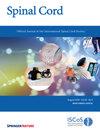Mindfulness- and acceptance-based interventions for people with spinal cord injury: a scoping review
IF 2.2
4区 医学
Q3 CLINICAL NEUROLOGY
引用次数: 0
Abstract
Scoping review. To synthesize the effects of mindfulness- and acceptance-based interventions (MABIs) on health-related outcomes of individuals with spinal cord injury. The included studies were conducted across four countries: The United States, Iran, China, and The United Kingdom. This review followed the Arksey and O’Malley framework and the Preferred Reporting Items for Systematic Reviews and Meta-Analyses Extension for Scoping Reviews guideline. Seven databases were searched until November 2024 to identify studies published in English-language that evaluated MABIs’ effects on health-related outcomes in people with spinal cord injury. Literature screening, data extraction, and quality assessment were conducted by two reviewers independently. A narrative data synthesis was conducted. Of 2389 records, nine studies were included with designs of randomized controlled trials (n = 4), quasi-experimental studies (n = 3), and case studies (n = 2). Acceptance commitment therapy (n = 4) and mindfulness-based interventions (n = 5) were employed. MABIs demonstrated significant improvements in psychological health outcomes (depression, n = 3; anxiety, n = 3; stress, n = 2) with medium-to-large effect sizes ( $${{{{\rm{\eta }}}}}_{{{{\rm{p}}}}}^{2}=0.112-0.223$$ ) and other health-related outcomes (chronic pain, n = 1; functional independence, n = 1; engagement in meaningful activities, n = 1; and quality of life, n = 1). Participants found the MABIs to be acceptable and satisfactory. Study quality varied from weak (n = 6) to strong (n = 2). The findings generally support the acceptability and effectiveness of MABIs for improving the overall well-being of individuals with SCI. Future research directions regarding designing MABIs and exploring effectiveness mechanisms were recommended for maximizing its benefits.

对脊髓损伤患者的正念和接受干预:范围综述。
研究设计:范围审查。目的:综合正念和接受干预(MABIs)对脊髓损伤患者健康相关结局的影响。环境:纳入的研究在四个国家进行:美国、伊朗、中国和英国。方法:本综述遵循Arksey和O'Malley框架以及系统评价的首选报告项目和范围评价的元分析扩展指南。截至2024年11月,研究人员检索了7个数据库,以确定以英语发表的评估MABIs对脊髓损伤患者健康相关结果影响的研究。文献筛选、数据提取和质量评估由两名审稿人独立进行。进行了叙述性数据综合。结果:在2389份记录中,纳入9项研究,设计为随机对照试验(n = 4)、准实验研究(n = 3)和病例研究(n = 2)。采用接受承诺疗法(n = 4)和正念干预(n = 5)。MABIs显示心理健康结果有显著改善(抑郁症,n = 3;焦虑,n = 3;压力,n = 2)具有中大型效应量(η p 2 = 0.112 - 0.223)和其他健康相关结局(慢性疼痛,n = 1;函数独立性,n = 1;参与有意义的活动,n = 1;生活质量,n = 1)。参与者认为MABIs是可以接受和满意的。研究质量从弱(n = 6)到强(n = 2)不等。结论:研究结果普遍支持mabi在改善脊髓损伤患者整体幸福感方面的可接受性和有效性。建议未来的研究方向是设计mabi和探索其作用机制,以最大限度地发挥其效益。
本文章由计算机程序翻译,如有差异,请以英文原文为准。
求助全文
约1分钟内获得全文
求助全文
来源期刊

Spinal cord
医学-临床神经学
CiteScore
4.50
自引率
9.10%
发文量
142
审稿时长
2 months
期刊介绍:
Spinal Cord is a specialised, international journal that has been publishing spinal cord related manuscripts since 1963. It appears monthly, online and in print, and accepts contributions on spinal cord anatomy, physiology, management of injury and disease, and the quality of life and life circumstances of people with a spinal cord injury. Spinal Cord is multi-disciplinary and publishes contributions across the entire spectrum of research ranging from basic science to applied clinical research. It focuses on high quality original research, systematic reviews and narrative reviews.
Spinal Cord''s sister journal Spinal Cord Series and Cases: Clinical Management in Spinal Cord Disorders publishes high quality case reports, small case series, pilot and retrospective studies perspectives, Pulse survey articles, Point-couterpoint articles, correspondences and book reviews. It specialises in material that addresses all aspects of life for persons with spinal cord injuries or disorders. For more information, please see the aims and scope of Spinal Cord Series and Cases.
 求助内容:
求助内容: 应助结果提醒方式:
应助结果提醒方式:


